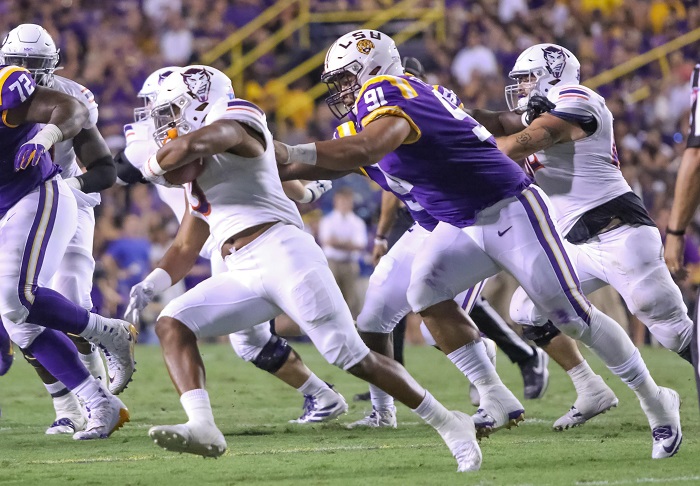
College campuses are designed to be hamlets where inspiring halls and broad magnolias shield students from dangers of the outside world. At LSU, there have been just two murders on the grounds of the Ole War Skule in its history. There was almost a third last year as popular Louie’s Café dishwasher Donald Smart was gunned down by a white supremacist a few yards from the gates of the university as Smart was walking to work on Alaska Street for the start of his 11 p.m. shift.
Southern University is also a pristine and picturesque oasis isolated from the brutal violence that afflicts nearby neighborhoods. The peace on the bluff was jolted early Friday morning a few yards from the Southern campus as LSU basketball player Wayde Sims died of a gunshot wound to the head.
Sims was 20 years old, the same age as his accused assailant as one life ended abruptly and another was irrevocably changed at 12:25 a.m. outside a Subway restaurant on Harding Boulevard. “He brought a gun to a fistfight” is the way a law enforcement official described the tragedy that may send Dyteon Simpson to jail for the remainder of his days or to death by lethal injection at Angola State Prison.
Simpson is charged with second degree murder and reportedly had only a minor arrest on his record. Sims was destined for a full life that included two more years of growth as an athlete and as an individual playing for Will Wade’s unit. The coach had singled out the 6-foot-6, 217-pounder for his hard work leading up to the season that is soon to start.
This type of tragedy happens frequently in a mid-size city where more than 100 murders were committed in 2017. This computes to a one in 4,000 chance of being slain in East Baton Rouge Parish every year, and through an 80-year life, there is a one in 50 chance of being a murder victim in the Capital City at some point in that life. The numbers are taken by dividing the number of murders by the population of EBR Parish.
There should be an urgent and concerted effort to warn all people of the immense responsibility that goes with toting a lethal weapon. Kids should invest more time working out than perfecting the art of killing a fellow human. This means more physical fitness which breeds character, discipline and self-respect. It is a travesty to see law enforcement officials, some at high levels, in lousy physical condition. Firing a gun should be an act of last resort, not the first option. For citizens and for officers.
For years, I watched in admiration as some of Baton Rouge’s finest dined at Almaza on East Boyd Street. These men looked like they came from central casting, the epitome of what a law enforcement official should look like. Most cops are fine physical specimens. Fitness on the force should be a strictly enforced requirement, not merely an elusive goal.
Wayde Sims was a chiseled athlete in the prime of his life, but no man is a match for a bullet. This is why it is inexplicable for another man to feel like a tough guy by firing at point black range at another man. These punks are not brave. They are cowards who warrant the fate they provide to their victims.
I recall Wayde’s dad, Wayne, who played with Shaquille O’Neal and Chris Jackson. In 1990, Wayne, a junior forward a bit bigger than his son, was sixth in scoring on the most gifted team in LSU history. The leading LSU scorers in order that season were Jackson, Stanley Roberts, O’Neal, Maurice Williamson, Vernel Singleton and Sims, who averaged eight points, five rebounds and two assists for the 23-9 Tigers.
Wayne was the first LSU player to wear jersey No. 44 after Don Redden, the gifted Tiger guard who died of a heart attack at age 24 in 1988. The sadness sweeping the LSU campus last week was reminiscent of the grief that gripped the basketball program and the university three decades ago when Redden died two years after leading LSU to the Final Four.
Wayde Sims also wore No. 44. Like Redden, he was not only physically impressive but had the looks to be cast as a matinee idol. Wayde was born in 1997, a decade younger than another Baton Rouge prep basketball legend, Ryan Francis. Two promising lives were lost before age 21 in their hometown by gunfire from men of the same age.
Like Wayde, who led University High to three state titles, Francis, a point guard, lifted Glen Oaks to a 36-0 record and the Class 4A state title in 1995.
Francis opted to play at USC and started for the Trojans as a freshman, ranking seventh in the Pac-10 in assists and fifth in steals and scoring seven points per game, one point higher than the average that Sims produced last season for LSU.
Francis, who had returned home from Los Angeles after his freshman year, was killed at 2:50 a.m. on May 13, 2006 while riding on Acadian Thruway. According to the police report, 19-year-old D’Anthony Ford was driving an SUV and pulled in front of the car carrying Francis after recognizing the car’s driver as someone he had been involved in a dispute with earlier that night. Francis was sitting in the back seat where he was shot multiple times. He was 19.
Like Sims, Francis was an only child.
It should not require a high profile athlete losing his life each decade at the hands of a gutless assassin to emphasize the carnage that occurs several times a week on the streets of the Louisiana Capital.
For a child born in our city today, there is a two-percent possibility for that newborn life to end in murder. For young men, the percentage is even more alarming. Would any of us board an airplane knowing that there is a two-percent chance of a crash?
We may delude ourselves into thinking our world is safe, but there is no sanctuary from the violent reality in our midst. The sooner that community leaders from all facets of life recognize that we are all in this predicament together, the better the prospects will be for improving our quality of life and for all of us to anticipate a long life.




Be the first to comment